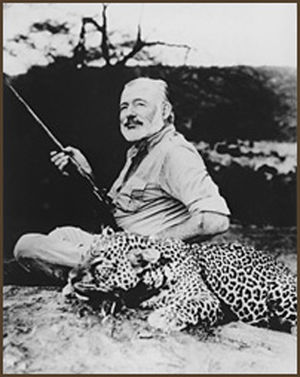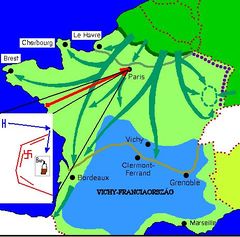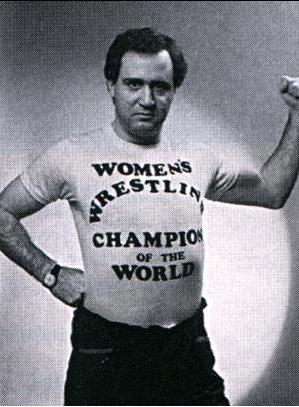Ernest Hemingway
“They walked through the field. It was big. There was lots of grass. It was summer, so there were many flowers.”
“The light didn't work. He went in. It was dark. He couldn't see anything.”
Ernest Miller Hemingway (July 21, 1899 – July 2, 1961) was an American author. He lived. Primarily in the first half of the twentieth century, then for a while in the last half. He wrote things (such as books), drank things (such as alcohol), and shot things (such as his face). He had a beard. He married more than his fair share of rich women. He once owned a tiny Jewish slave named Windemere.
Let us examine this complex man and his complex works. Without neglecting his complexity.
Early life
Hemingway was born in the United States. His father was an Amish magician. His mother was not. He cried a lot when he was a baby. Babies cry a lot. Sometimes it is because their pants are heavy. Sometimes it is because they cannot have fine French wine. Even as a baby Hemingway could tell a good wine from a bad one.
Hemingway cried. He did not have decent French wine. He would have it later. But right now he did not have it. The house did not have indoor plumbing. It would have it later, when Ernest was ten. When he turned ten he would be fascinated with the hot and cold taps. He would call it a Big Two-Heated River. He would wish the taps would pour out whiskey and absinthe. But they did not. Besides, his house did not have plumbing yet. While he was looking for a restroom, he would often shoot things.
His mother hoped her son would develop a hamster-like body. He did not. Hemingway adopted his father's figure, that of a humpback whale. This helped him to swim and to fish. He used the baleen to fish. He also developed a love of guns. Perhaps from his experiences shooting at the family slave, Windemere. When Windemere escaped, Hemingway would shoot at him. When Hemingway escaped Windemere would be shot. It was a hard life. Windemere turned to absinthe for relief. But the story is not about Windemere. Perhaps later it will be.
One day Hemingway got so drunk he could not find his way home. He went to the wrong house and up-chucked on their doorsteps, then slept in his chunder. His parents were very upset, not because he could not find his way home but because he was only five when it happened.
He would lick absinthe and Windemere.
Love and the young man
Hemingway volunteered for the Army before the first World War started. He was a [unprintable] and wanted to [unprintable] some of the other prime soldiers with their ripe [unprintables]. He really did believe in it very much. It was to be a tough war, but he liked that sort of thing. Perhaps there would be people or animals to "do", he thought. There would be many people and animals to "do" later, but right now he did not know how.
"I will have an absinthe before the war," he said to a waiter in Portugal. It was not clear whether this was in Portuguese or not, but Hemingway almost certainly spoke the language better than the other Americans around him. The waiter brought him the absinthe and a glass. There was a sugar cube too and a spoon. Also, there was water. These are all the things one needs to have absinthe.
He did not get a gun though. Mainly because he was too tight to pick one up. Had he known this would happen maybe he would not have drunk the absinthe. He was sad. "I'm not worth a damn," he murmured. This state of depression could not be repaired by any normal means. It would take a strong dose of that green bitter spirit to fix this. He opened his flask.
But again, he was drunk. Had he known it was a grenade he probably would not have tried to open it. But he did not know it was a grenade. He thought it was his flask of absinthe. And so he opened it. His arms exploded. His legs exploded. His absinthe survived the blast, but he could not drink it because he did not have arms. He later used this episode as inspiration for his war novel A Farewell to Limbs.
He had his limbs replaced with guns. So he could shoot things. When he walked, he would shoot. But he also shot when he tried to shake hands. People did not want to shake hands with him much. He could not understand why.
His gun limbs came in handy in the next war. This was the Spanish Civil War. America was not involved in this war either. But it was a good excuse to shoot at people. And drink absinthe. How did he drink absinthe with gun arms you ask? From both barrels. And so he went to this war.
Unfortunately, he got a little tight one night. He lost Spain to Franco in a bet on a bullfight. If he had known he would lose he probably would not have made the bet. But he did not know that. He liked the war though, so much that he wrote a book about it.
He decided Spain was not worth a damn. He joined World War II, the sequel. He was not supposed to be in this war either. But he went anyways. The Nazis had occupied his favorite bar. His favorite bar was the Ritz Paris. He did not believe the allies would liberate it fast enough. So before the allies invaded, Hemingway and his friends did. For a time, France was divided between the Vichy regime, the Nazis, and Hemingway.
Genius
Hemingway began writing after the war. There was nothing to do and no one to shoot. There was not much absinthe either. But you could get it if the people knew you. Those men over there are customs officers. You can't have a spoon and a sugar cube anymore. If you do they will know what it is.
Post-war Paris was a hotplate of artistic innovation. Matisse had just shot the Prime Minister full of horse. Toulouse Lautrec was gnawing the very ankles of the Establishment. Gertrude Stein was in hot pursuit of Alice Toklas. The chase would lead into dark labyrinths of madness and chlamydia. F. Scott Fitzgerald had just finished his first movie. Emma Ovary's poetry was the toast of every breakfast. But not for Hemingway. His breakfast toast was not toast at all. It was made of rye, yes, but this rye was liquid. And it was not bread. It burned and warmed as it went down. Bread does not do that.
Hemingway wrote a book. It was about a man who killed things with guns and got drunk. It was a marvel. People wondered where he found such material. To try to explain it he wrote The Sun Also Arises As Well. This did not work as well.
Style
Hemingway wrote books. The writing was good. But he had to follow up. If you don't follow up it's not worth a damn. In order to write like Hemingway it is necessary to have many things.
- A wife who is sort of a lesbian.
- Whiskey and water.
- A glass. So you can put the whiskey and water in it.
- Ice. So the whiskey and water will be cold.
- Spain or France. This is why Hitler and Franco took over both countries.
- Absinthe.
- Paper, maybe.
Hemingway was usually tight when he wrote. He usually had at least two lesbians around him. Sometimes it was Toklas or Stein. Sometimes it was not. When he wrote For Whom the Bell Tokes it was Toklas and Stein, eating brownies off each other. Without using their hands. But he was focused on his writing. The writing and his whiskey. So he did not know about Toklas and Stein at the time. He would know later. When he was not writing anymore.
Controversy
Hemingway was controversial. Many people did not like him. They said things about him. Some of the things were not nice. Many point out that he did not like gays. He was a manly man. And gay people are not very manly. Also, he always wore flannel. Flannel is the natural enemy of gay.
Some believe this was to cover up his own homosexuality. They point to his obsession with ramming phallic objects into a bull. They also mention that all his marriages fell apart. But if Hemingway was gay, where did all these little Hemingways come from? And why did they all kill themselves? Suicide is a manly thing.
Some have said Hemingway's prose style isn't good. They claim it is too bland. That it is not intellectually stimulating. They are wrong. If they knew how stimulating his prose style was, they would not say that. But they did not know.
Many mention that Hemingway treated women like trophy hunts. This is not true. Hemingway might have liked to fight animals. He did not fight women. They were not fair game. Because they were small. Women would look silly mounted next to a lion. On the few occasions he shot women he simply took their breasts as trophies. But he did not put them beside the lion. It would have looked silly. He did not want to look silly.
Later years
Hemingway lived a life of hunting and wine. He would also fish. He also liked women and possibly men. We do not know. Except we do. But we can not tell you. That would not be nice. What we do know and can tell you is that this life wore on him. Maybe it was the two plane crashes. One of the plane crashes paralyzed his buttocks. He was heard saying it hurt.
Because of this he became crazy and sad. His only solace was in electrocuting himself. And liquor. When the doctors decided he was okay, they sent him home with a shiny new gun to help him forget about his troubles. The gun was purchased from Abercrombie & Fitch. Guns are a good way to forget your problems. Especially when your problem is your wife and there is a shovel on the other end of the gun. But Hemingway did not have a gunshovel. Nor was his problem with any of his four wives. If it had been, he might have needed a gunshovel.
Death
As F. Scott Fitzgerald famously said, Hemingway was impossible to kill. Bulls, wild animals, other authors, planes, Nazis, nationalists, wives and absinthe all tried. The reason for this is that Hemingway had a +13 Gold Shield. And a +5 Mace. Nothing could pierce his thick leathery hide.
Fitzgerald, a crafty bastard, finally made a bet with Hemingway. By this time the shock treatments had taken their toll. Hemingway had taken up the nickname "Mama". He lived in Cuba for a time with Fidel Castro, who was known by the islanders as "Papa". They started a folk group, but it was not worth a damn. The writing was no good.
Fitzgerald did not know he would succeed in killing Hemingway. But he had to try. He could not stand to hear "California Dreamin'" again. Yes, he would try. He bet Hemingway a margarita that he couldn't kill himself. So Hemingway fired a shotgun into his mouth. But it didn't do anything. The coroner's report found that he had to reload and fire again three times before he went down.
Hemingway is the most dangerous game.
Bibliography
Major novels
- A Farewell to Arms, a novel describing the life of a war veteran who lost both his arms in the war.
- A Farewell to Legs, a novel describing the life of a war veteran who lost both his legs in the war.
- A Farewell to Kings, a novel describing the life of a war veteran who lost his favorite Rush album in the war.
- A Farewell to Limbs, a grim account of a war veteran rowing across Lago Lomondo by holding the oars in his teeth. His girlfriend expires of an overdose of pathos, and he ends up in a Swiss sanitarium.
- For Whom The Bell Tolls, a novel of the Spanish Uncivil War. The title is taken from a line of John Donne's poem The Island of Man: "Ask not for whom the bell tolls, just answer the damn door."
- The Old Man and the Sea, a short novel describing the terrific struggle of a Cuban fisherman trying to land a gigantic writer he has hooked.
- The Sun Also Rises, a powerful tale of love, absinthe, and the Duchess of Cornwall.
- Across the River and Under the Trees, the story of a heartsick American colonel who is screwed to death by his insatiable Italian mistress under the lovely shade of a forest, which obviously enhanced the performance.
- Islands in the Steam, a wandering tale of U-boat espionage and talking land crabs. Later made into the movie Das Boot. It is famous for the description of a volcano explosion that covered the island with its steam, making everybody rather unhappy with the hazy horizon.
- True at First Light, released posthumously. This "fictional memoir" tells of a safari in Kenya undertaken by Hemingway, during which he is preoccupied by his desire to have a stimulating experience with a hot African honey named Laqueesha. It is generally considered to be Hemingway's best work.
Lesser works
- Defecate in the Afternoon, an account of Spanish bullfighting and Spanish bathrooms.
- To Kludge and Kludge Not, inarguably his worst novel. The protagonist makes love like a sea turtle and the pith gets everywhere.
- The Green Hells of Africa, his attempt to write "a completely, absolutely, unflinchingly profitable book".
- A Moveable Fast, a memoir about starving in Paris. George Orwell was writing Down and Out in Paris and London at the same time and the two writers took bets on which would be more pathetic. Orwell won.
- The Goodies of Eden, a semi autobiographical story published posthumously. The story details an author who wants to get in a young Spanish girl's pants. But here's the twist: His wife wants him to get in a young Spanish girl's pants, too!
Collections of short stories
- Men Without Women, the book where Hemingway speaks of his passive homosexual relationships with Che Guevara and the boxer Sonny Liston. It is famous for its starting line: "Men in, women out: turn men on, turn women off" – Mike Tyson had it printed on his trunks.
- In Our Time, a collection of hardcore erotic tales where Hemingway audaciously sponsors homosexuality as the new frontier of a brave new era of bravely poncy men.
- Winner Take Nothing, another collection of short stories where Hemingway suggests never to get involved in a homosexual relationship if you are not willing to lose your virginity (or "take nothing") and thus renounce your status as a winner. A very sophisticated concept, indeed, which was widely acclaimed by the best critics of San Francisco.
See also





